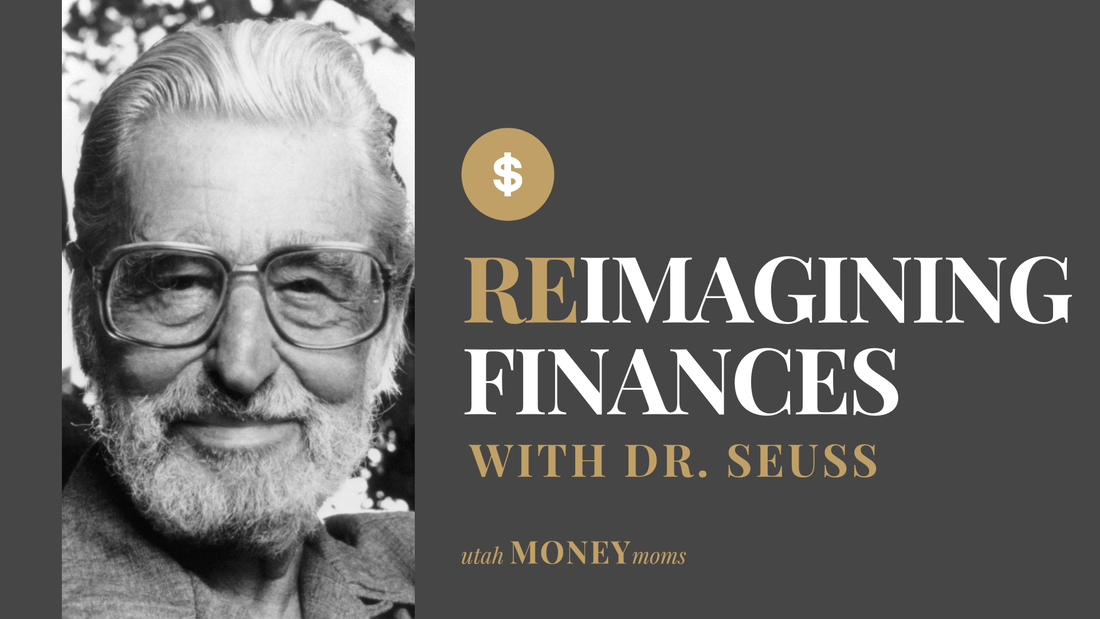|
Andrea Schmutz, USU Extension Faculty Last year, in a post titled “Dr. Seuss and his Delightful Discourses,” I encouraged readers to use Dr. Seuss books as thought provoking motivators or reminders in their efforts to apply financial best practices throughout 2021. To celebrate Dr. Seuss’s birthday this month, I’ve expounded on a few more of my favorite whimsical, entertaining stories and their relationships to our personal paths to financial wellness. Dr. Seuss had a gift: he reimagined everyday experiences - like reading, going to sleep, and doing chores - to make them extraordinary. In honor of the good doctor’s birthday, let’s use his writings to help reimagine the everyday world of finance and infuse a much avoided topic with fun reminders and clever connections. Green Eggs and Ham - Dr. Seuss’s publisher challenged him to write a book with only 50 words. To put it in perspective, the ever popular The Cat in the Hat uses 236 words. Green Eggs and Ham uses exactly 50 words - the least amount of words in any Dr. Seuss book and yet it became his bestselling book. In terms of finances, we need to remember that it’s not how much money we make but what we do with the money we earn. Our paycheck may not be as high as we’d like, but we can find inspiration in Dr. Seuss’s wild success using only a minimum amount of words. Using simple finance tricks such as paying yourself first, the step down principle, or following the three R’s of budget sustainability, will help you on the road to financial wellness. Before you decide that these ideas won’t work for you, listen to the immortal words of Dr. Seuss: “You do not like them so you say. Try them. Try them. And you may. Try them and you may I say.”
What Pet Should I Get? - “Now which would we pick? We could only pick one.” A brother and sister are allowed to choose just one pet. With so many choices, they must weigh the pros and cons and constantly remind themselves that they could only have one. Making decisions is hard. When we are deciding what to do with our money, we should take a lesson from the brother and sister and weigh the pros and cons of each decision while examining the short and long term consequences. Do we remind ourselves regularly of our financial goals and our previously made decisions about where our money should go? Do we examine the consequences of everyday financial decisions? The Cat in the Hat - One of Seuss’s most recognized stories, The Cat in the Hat is loaded with valuable lessons that can be tied to financial wellness. 1.) You don’t have to spend a lot of money to have fun. 2.) Hard work helps us reach our goals. (The cat managed to clean up the entire mess before the mom walked in the door.) 3.) Even the worst messes can be cleaned up. If you find yourself in a mess (financially or otherwise), look for ways to make it right. Start simple. Just as the brother in The Cat in the Hat used a simple butterfly net to catch Thing One and Thing Two, you don’t need an extravagant plan to reach your financial goals. Start by tracking your expenses, or decide to pack a lunch most days instead of eating out. Just pick something and start doing it. The 500 Hats of Bartholomew Cubbins - Just the mere title of this book causes me to pause - 500 hats seems excessive. Am I excessive in any one area of my finances? If you read this story, you’ll learn that Bartholomew cannot do anything about his magically growing hat collection. He bravely faces the challenges the hats bring and persistently strives to correct the situation that is beyond his control, until he overcomes the problem and actually walks away with a good sum of money. Are we persistent in the pursuit of our financial goals? When it feels like things are out of our control, do we give up or do we push through the challenges? Oh, the Places You’ll Go! - One of my all time favorite Seuss works, Oh the Places You’ll Go! reminds me of my potential for success, in everything from reaching my fitness goals to managing my finances. When I am facing challenges, I like to open this book and start reading it with my specific struggles in mind. Having a hard time sticking to a budget? Questioning your ability to pay off your debts? Want to buy a house but can’t quite see how you will ever save up for a down payment? Listen to Dr. Seuss when he tells you, ”You have brains in your head. You have feet in your shoes. You can steer yourself any direction you choose.” He’s pretty much telling you that you CAN do whatever it is that you need to do! While Seuss’s characters and words are often far from real, his messages are down to earth. After offering words of encouragement, Seuss acknowledges that life still happens no matter what we do. Seuss writes, “I’m sorry to say so but, sadly, it’s true that Bang-ups and Hang-ups can happen to you.” We may have a bad week and spend more than we should, or maybe we don’t get the raise that we so badly need, or a pandemic hits and our employer cuts back our hours. While these challenges may set us back, we can push forward and keep taking small steps on the road to financial wellness. “So, be sure when you step, step with great care and great tact and remember that life’s a great balancing act...And will you succeed? Yes! You will, indeed! (98 and ¾ percent guaranteed.)” Spoiler alert: Maybe Dr. Seuss doesn’t really teach about finance in his books. But he teaches basic lessons that can be applied to finances. Once you make a personal connection between Dr. Seuss’s stories and your path to financial wellness, you get free reminders and pep talks every time you read those silly rhymes and look at those colorful, zany pictures. Go find your favorite Dr. Seuss book and figure out what advice the story is giving you about your finances. Be careful, it becomes a little addicting trying to find hidden meanings in each story. I’d love it if you leave a comment and tell me what your favorite Dr. Seuss story is and what underlying message speaks to you. Parting thought: “If things start happening, don’t worry, don’t stew, just go right along and you’ll start happening too.” - Dr. Seuss
0 Comments
Your comment will be posted after it is approved.
Leave a Reply. |
TAKE A FREE CLASS!Host a ClassamandaSharing real-life money smarts to help you stay on track with financial goals while still enjoying life! Follow the fun on InstagramAS SEEN ONawardsBest of State 2022 & 2023: Personal Finance Education
1st Place National Award in Social Media Education from the National Extension Association of Family and Consumer Sciences
Gold Award in Blog Site category at the 7th annual Education Digital Marketing Awards.
Platinum Award in Digital Media, Web Design category at the International Marketing and Communication Awards.
Categories
All
|








